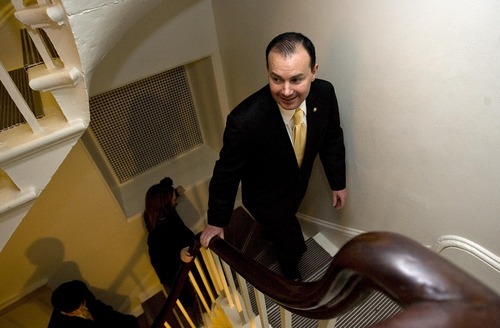This is an archived article that was published on sltrib.com in 2011, and information in the article may be outdated. It is provided only for personal research purposes and may not be reprinted.
Plenty of politicians endorse candidates or send them a contribution, but Sen. Mike Lee wants to take it to a whole new level.
He's asked the Federal Election Commission to allow him to accept unlimited funds from corporations and the wealthy in a political action committee that he would use to support like-minded conservatives running for Congress.
In essence, the freshman senator from Utah wants to be the first sitting officeholder to directly run his own super PAC.
"This is taking the campaign finance world into new waters," said Michael Beckel, spokesman for the Center for Responsive Politics. "As super PACs have arisen, most candidates have tried to keep their relationship with these groups at arm's length."
That means they might attend a fundraiser or ask for a small dollar amount, but candidates have not directly solicited unlimited contributions that are the hallmark of these new groups created in the wake of the Supreme Court's decision last year in the Citizens United case.
Lee's Constitutional Conservatives Fund sent its legal argument to the FEC last week, requesting an advisory opinion that would allow it to accept donations of any amount as long as it puts the cash in a separate fund that would only be tapped to support candidates Lee endorses or oppose candidates he thinks should be defeated.
Through the PAC's attorney Dan Backer, Lee argues that recent court rulings that created super PACs and allowed PACs to have separate legal accounts, should also apply to candidate-sponsored groups.
"This would be ground-breaking," said Paul Ryan, an attorney with the Campaign Legal Center, which opposes super PACs. "And it would be squarely illegal."
The law now prohibits candidates or officeholders from soliciting donations that go beyond federal limits, either for themselves or for another political entity.
Backer said Lee is not seeking a new FEC opinion on candidates asking for money, but rather whether a leadership PAC could accept a big donation as long as it segregates the money in a different account.
"We are assuming the senator is not personally going to solicit anything," Backer said, though he acknowledged that if the FEC accepted Lee's position the next step would be asking for guidance on how involved an officeholder or candidate could be.
He said Lee, who is an attorney, became interested in the issue as a First Amendment question and has not received a donation, solicited or otherwise, of more than $5,000.
Ryan argues that if Lee were successful, he would essentially sidestep the very purpose of most campaign finance laws, which is to fight the potential of political corruption that comes from a candidate that could access big money from a single source.
Lee's attorney says that since his PAC would use the money to advocate for the election or defeat of other candidates that no threat of corruption exists.
Ryan calls that argument "absurd."
"The ability of Senator Lee to ask for million-dollar checks would most surely present the possibility of corruption," he said, contending that the threat of corruption is "dependent upon the successful solicitation by a federal officeholder, not what bank account it goes into or how they spend the check."
Under the current rules, Lee's political action committee can only raise $5,000 from each individual or PAC in a calendar year. And it can then re-gift that money to politicians he supports at the same $5,000 limit.
Lee's Constitutional Conservatives Fund has endorsed four Senate candidates, none of whom are from Utah. He is supporting Ted Cruz's campaign in Texas, Rep. Jeff Flake's campaign in Arizona, Don Stenberg's campaign in Nebraska, and Daniel Bongino's campaign in Maryland.
So far, the fund is far from a powerhouse. Lee has only been required to file one campaign disclosure and that report, made public in July, shows the senator transferred $5,000 from his normal campaign account to his PAC and had not yet raised any money.
But it appears that Lee wants to emulate, if not revolutionize, the support he received from Sen. Jim DeMint, R-S.C.
DeMint's Senate Conservative Fund spent $190,000 in independent expenditures to support Lee's 2010 campaign, according to a Sunlight Foundation review. Lee was one of a handful of candidates that DeMint bankrolled, with the money covering general campaign expenses such as mailings and polls.
DeMint's leadership PAC deals in the millions of dollars, funneling the money in two directions. First, it asks supporters to give money directly to its favored candidates and second, the money given to the PAC is used to benefit those candidates.
DeMint's PAC sticks to the contribution limits for candidate committees.
The FEC is likely to issue an opinion on Lee's request by the end of November.
Twitter: @mattcanham



